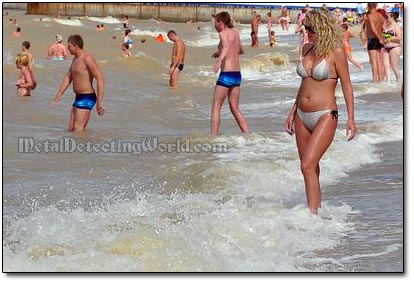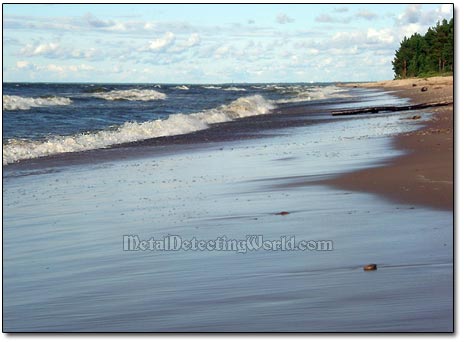Types of Metal Detecting Activities, page 15:
BEACH HUNTING, Beach Combing
(CONTINUED from previous page)
WHEN TO BEACH HUNT
Beach hunting can be carried out during the following times:
1) During the season and during the day
This time interval would not be very productive as too many people likely will be "in your way" and some of them will feel a little uptight about your activity.

2) During the season and "after hours"
This time interval will give you an opportunity in recovering gold jewelry that would have been lost during the day, have no time to sink deeper through the sand, and have less chances in being picked up by others. Also, detecting during the early morning hours (before the crowds arrive) may bring you good results.
Some beach goers take their rings, bracelets and chains off and place them on a beach towel or blanket before swimming. Some of these swimmers stay until darkness, and while getting ready to go home, they would shake their towels without noticing their jewelry being shaken off along with sand.
The shortcoming of this time interval is that the thickest sand layer on the beach occurs during the summer. That is why the old jewelry and coins (usually silver ones) are nearly impossible to find on beaches during the summer months.
3) During the season and after the Rain
Many beaches, even those which may have seemed searched out, will produce coins and jewelry after the rain storm. On the beach, some small wash-outs are usually created by raining, and they lower the sand level. This allows a metal detector to "catch" targets that have previously been outside the range of detecting depth.
4) During the season and after the Storm
During the storm, strong winds and sea/ocean waves slightly erode the beach and bring buried valuables closer to the beach surface. Also, storms wash the sand in from the sea along with a lot of jewelry and coins. Plus, the sand has been stirred, and valuables may be on top or closer to the surface right after a storm.
5) Off-Season
This time interval could be very productive as there would be no beach goers around, the deeply buried jewelry would be more accessible, and the sand layer would be getting thin as the winter storms would be moving most of the sand into the ocean. Some private beaches can be searched only during the off-season.
Winter is the best time for both dry and wet beach hunting as higher tides begin to "strip" the beach of its "summer sands" uncovering many of valuables, and most of the shallow jewelry will be moved together with sand into the surf. When the summer beach sand disappears, the beach metal detecting is at its finest!
The greatest amounts of coins and jewelry can be found washed ashore on the beach at the changing of tides - low tide to high tide, during periods of beach erosion, not during beach rebuilding. The trick is to "catch" the beach when the erosion cycle is occurring. Learn how to use the tide timetables or just learn how the tides affect your beach. When you travel around to different beaches is when you really need to be up on how tides work.
A beach hunter has to "watch" the beach - watch the weather, the wind direction, tide timetables and full moon. A nicely eroded beach can be totally ruined by just one high tide! A couple of inches of the new sand may be all it takes to turn a "bonanza detecting day" into an uneventful winter day on the beach.
One thing to remember is that 99% of all shipwreck coins to be found on beaches has already been there for hundreds of years. Finding these coins depends more on the right timing (when the beach erosion will let the ancient coins appear) than on search techniques.

CONTINUED ON NEXT PAGE...